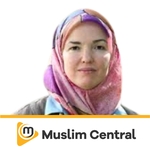Ingrid Mattson – Speaks about women in Islam 14

AI: Summary ©
The host of the transcript introduces Dr. Ingrid Madsen, the head of the Islamic Society of North America, who discusses the gender stratification of the Islamic society. Madsen explains that the society values strength, force, and being a dominant warrior, and that women were the most likely to respond positively to the message of Mohammed. She also discusses the early supporters of the prophet's message, including women who experienced hardship and were among the delegation that left Mecca at the command of the prophet's king to seek refuge.
AI: Summary ©
Hi. Welcome to Perspectives on Faith. I'm your
host, Metin Tekka.
This week, we're coming from Hartford Seminary
in Connecticut.
We have with us today doctor Ingrid Madsen.
She's a professor of Islamic Studies at Hartford
University,
and she's also the president of the Islamic
Society of North America.
Doctor Madsen, thank you for coming on our
show.
You're welcome. Would you describe the gender stratification
of the society in which prophet Mohammed grew
up in?
What you have to understand about pre Islamic
Arabian society, first of all, is that
it was a society
in which there was no rule of law.
There was no political structure that was governing
the Arabian Peninsula.
The,
only
ruling powers were tribes
that were in mutual,
rivalry.
These tribes became
or operated in in a way similar to
a gang structure.
What that means is that the only way
to have power,
the only way to promote your interest
is by using brute force.
The tribes are are highly territorial
and are in constant conflict with each other.
A society like this
values
strength,
force,
and is highly militarized.
What that means is that,
for women,
their position
is is
secondary to that of men,
who who, through their strength
and through their,
violence,
exercise their will.
So the basic structure of this society is
one in which women,
as
mostly noncombatants,
are in a secondary position to men.
So why would women respond positively
to the message of Mohammed?
The prophet Mohammed, peace be upon him,
both through his attitude and as the messenger
of God
with the Quran that that he received from
from God,
brought a message that women,
are equal to men,
in their value.
And not only that, that that in fact,
how you value a human being
is not through
their
brute strength,
not through their
ability to
dominate,
but in fact, their ability
to submit themselves to God. So there's a
whole different
paradigm shift,
of what makes a human being valuable.
In pre Islamic Arabia, what made a human
being valuable
was to be
a,
a dominant
warrior, someone who,
who by whatever means necessary,
subjected other people to his will.
What the Koran says is that the person
who is valuable in is
the one who is most noble in the
eyes of God is the one who has
most awareness of God.
That awareness is something that can be gained
by either a man or a woman.
That, that your gender has nothing to do
with whether you have the ability,
to submit yourself to god. So there's a
completely different,
assessment
of the value of a human being,
according to the Quran,
the Quranic paradigm.
Could you provide examples
of these women's
responses
initial responses to Mohammed's message?
Well, as is well known, the first person
who responded
to,
the prophet Muhammad's message was his wife Khadija.
Khadija who was
really in all ways a full partner to
the prophet Muhammad, peace be upon him. She
was
a mature woman
who was,
financially
independent,
who was who had her professional career.
And she and and her husband
really weren't always
full partners, raising their family, having their business.
She knew him, as a woman knows her
husband, better than anyone. And when he received
the call,
by by God,
to come and bring this message, she was
the first to respond to him and supported
him and believed in him.
But,
you know, it didn't stop there. In fact,
women
were among the early supporters of the prophet
Mohammed.
You had not only women like Khadija who
was a free woman of high status,
but a woman like Sumayya
who was a slave woman, who was in
a highly degraded position,
and for whom this message of Islam
was one of her dignity.
Even in a if it appeared by
by all objective
measures that she was the most degraded
person in Meccan society.
How were these women participating in the public
realm
of Mecca?
Muslim women in Mecca,
experienced
hardship to the same degree that men did.
We find that, for example,
the first martyr in Islam was Sumayyah,
who was murdered
in a brutal fashion
by her
by Abu Jahal
for being a Muslim.
Because there was no
recognition in Mecca, in the political order of
Mecca of individual human rights, it was possible
for someone,
a so called free man, to kill a
slave with impunity.
Among the other women were Khadija
and the other women of,
the
Banu Hashim, the clan of the prophet Mohammed,
peace be upon him,
who,
were boycotted by the rest of Quraysh for
3 years,
who had to live on the outskirts of
Mecca and were deprived of,
meaningful sustenance. In fact, we know that Khadija,
died because she was weakened by the boycott.
She and other women suffered along with
the male, believers,
in that situation.
Women also,
were among the delegation
that
left Mecca
at the command of the prophet Mohammed to
seek refuge with the,
the ruler of Abyssinia,
a good Christian king
who gave refuge and comfort
to the Muslims who were persecuted in Mecca.
Women were there with the men. So Muslim
women were beside,
the men at in at all stages,
in the Meccan period.